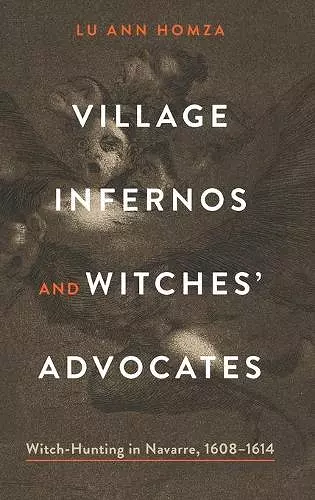Village Infernos and Witches’ Advocates
Witch-Hunting in Navarre, 1608–1614
Format:Hardback
Publisher:Pennsylvania State University Press
Published:18th Jan '22
Currently unavailable, and unfortunately no date known when it will be back
This hardback is available in another edition too:
- Paperback£29.99(9780271091822)

This book revises what we thought we knew about one of the most famous witch hunts in European history. Between 1608 and 1614, thousands of witchcraft accusations were leveled against men, women, and children in the northern Spanish kingdom of Navarre. The Inquisition intervened quickly but incompetently, and the denunciations continued to accelerate. As the phenomenon spread, children began to play a crucial role. Not only were they reportedly victims of the witches’ harmful magic, but hundreds of them also insisted that witches were taking them to the Devil’s gatherings against their will.
Presenting important archival discoveries, Lu Ann Homza restores the perspectives of illiterate, Basque-speaking individuals to the history of this shocking event and demonstrates what could happen when the Spanish Inquisition tried to take charge of a liminal space. Because the Spanish Inquisition was the body putting those accused of witchcraft on trial, modern scholars have depended upon Inquisition sources for their research. Homza’s groundbreaking book combines new readings of the Inquisitional evidence with fresh archival finds from non-Inquisitional sources, including local secular and religious courts, and from notarial and census records.
Expanding our understanding of this witch hunt as well as the history of children, community norms, and legal expertise in early modern Europe, Village Infernos and Witches’ Advocates is required reading for students and scholars of the Spanish Inquisition and the history of witchcraft in early modern Europe.
“Homza’s clear prose and detailed archival work weave a fascinating micro-history into the larger narrative of the early modern witch-hunts.”
—Chloé Roberts EuropeNow
“A fascinating and detailed study of a unique element in the witchcraft mania that swept Europe and New England.”
—Cliff Cunningham Sun News Austin
“Homza’s study will long remain an essential point of reference and an indispensable compass for social, religious and political history due to its critical rigor and interpretive acumen, as well as the amount of documentation examined.”
—Michaela Valente Archivio storico italiano
“. . .this specific module, between 1608 and 1614, of the historical period entitled witch hunts, could constitute a novel study paradigm, since it contains clear and unprecedented local circumstances, useful in the effort to reconsider the diverse approaches that until now have served, more or less, to elucidate a phenomenon as fantastic as it is brutal and real.”
—Alberto Ortiz Edad de Oro
“An almost compulsively readable, deeply humane book that weds empathy for its subjects with a clear understanding of the cultural and administrative context in which they lived their lives. It can be read profitably by newcomers to the field or by experts, and I expect that it will become the standard work on these trials for the foreseeable future.”
—Gretchen Starr-LeBeau Journal of Modern History
“This book will be of interest to anyone researching Catholic history or the treatment of non-Christian minority groups following the Reconquista. It can also serve as an important volume for anyone interested in the occult, as it debunks much of the mythology surrounding occultism, witchcraft, and European witch hunts in the early modern era. Highly recommended reading.”
—Rob Perry Religious Studies Review
“Village Infernos and Witches’ Advocates: Witch-Hunting in Navarre, 1608-1614 skillfully draws from inquisitorial and non-inquisitorial sources while highlighting the roles of children and engaging with the history of emotions. As such, it deepens our appreciation of this complicated witch hunt and shows that multiple ‘witches’ advocates’ helped bring this dramatic event to its end.”
—Rochelle Rojas Journal of the American Academy of Religion
“A wonderful addition to the scholarship not only on the witch-trails of Navarre but also witch-hunts throughout Europe and the Spanish Inquisition at large.”
—Veronica Menaldi Church History
“Homza’s research brings to the table a wealth of materials previously neglected or overlooked. Bristling with new and important insights into the village dynamics underlying Spain’s only serious witchcraze, Homza examines it from two quite different perspectives: that of the men, women, and most originally, the children implicated in individual accusations of witchcraft, and that of the learned inquisitors charged with investigation of individual cases. She also successfully positions the Navarre witchcraze within the wider compass of recent historiography on witches and witchcrazes in other parts of early modern Europe. This remarkably readable, comprehensive, insightful and nuanced study deserves a wide audience.”
—Richard L. Kagan, author of Lucrecia’s Dreams: Politics and Prophecy in Sixteenth-Century Spain
“Village Infernos and Witches’ Advocates employs a wide range of sources to provide a multi-angled view of the hunt as it developed. It also takes into account important developments in the field of history, principally in terms of social history and history-from-below, allowing for a startling and much-needed degree of revisionism. Its interpretation is new and greatly welcome. It will be a very important and widely cited book.”
—Michael D. Bailey, author of Origins of the Witches’ Sabbath
ISBN: 9780271091815
Dimensions: 229mm x 152mm x 24mm
Weight: 145g
260 pages